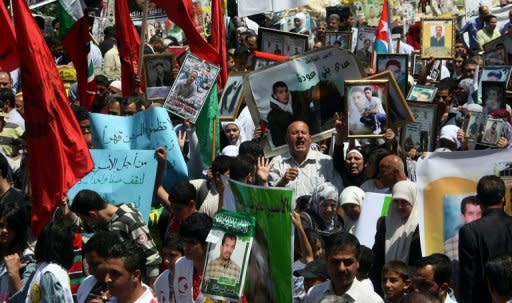Ban speaks out on Palestinian hunger strikers
UN chief Ban Ki-moon urged Israel to try or release hunger-striking Palestinian prisoners after activists denounced his "silence" in a protest outside the UN's West Bank offices. Dozens of demonstrators calling for action to help the weakening prisoners stopped UN employees from entering their offices in Ramallah, waving banners reading: "UNjust" and "UNfair." More than a third of the 4,700 Palestinian prisoners held by Israel are currently observing an open-ended hunger strike. Two of them -- Bilal Diab, 27, and Thaer Halahla, 33 -- were marking their 71st day without eating in protest at being held without charge. They are being held under a procedure known as administrative detention, which allows Israel to hold suspects indefinitely for renewable periods of up to six months. Another five prisoners have been refusing food for between 48 and 66 days. The vast majority began refusing food on April 17 to demand improved conditions, including family visits and increased access to lawyers, an end to solitary confinement and administrative detention. The International Committee of the Red Cross (ICRC) warned on Tuesday that six hunger strikers were in "imminent danger" of death and called on Israel to have them hospitalised. But Israel has so far rejected all appeals lodged by the hunger strikers, and refused family visits. They only briefly transferred one of them to a civilian hospital amid mounting protests from human rights groups as well as the UN. "We note with disappointment your silence ever since this protest movement began in December 2011," protest organisers said in an open letter to Ban. That was when one prisoner, Khader Adnan, began a 66-day hunger strike which put the international spotlight on the issue of administrative detention. Adnan ended his strike in mid-February after Israel agreed not to extend his detention. He was released on April 17. "This stands in stark contrast to your vocal and persistent remarks in support of formerly incarcerated Israeli soldier Gilad Shalit," the organisers added. Israeli soldier Shalit who was held captive by Gaza's Hamas rulers for more than five years before being released in October last year. "We urge you to take a firm and vocal position in opposition to Israel's abuse and violation of Palestinian prisoners' rights," they said. In a letter to the UN Security Council, the Palestinian mission to the UN reaffirmed the ICRC's call for the six most gravely ill prisoners to be moved to a specialist hospital. "Tensions in the occupied Palestinian territory, including East Jerusalem, are markedly rising due to the gravity of this issue and its continued non-resolution," the letter said. Later, Ban issued a statement through his spokesman calling on Israel to take action to prevent the longer-term hunger strikers' condition worsening. "The secretary general continues to follow with concern the ongoing hunger strike by Palestinian prisoners in Israeli custody, in particular, those held in what is known as 'administrative detention'," spokesman Martin Nesirky said. "He stresses the importance of averting any further deterioration in their condition," Nesirky added. "He reiterates that those detained must be charged and face trial with judicial guarantees, or released without delay." Diab's lawyer, Jamil Khatib, said his client had been transferred out of a civilian hospital and returned to the infirmary wing of Ramle prison near Tel Aviv on Monday, despite his serious condition. He also said Diab, Halahla and three other long-term hunger strikers had begun refusing all intravenous liquids as well as any medical treatment from staff at the infirmary. "Since yesterday (Tuesday), they have refused IVs and treatment from the prison staff as well as medical check-ups," he said. "They are continuing their strike and are willing to continue until death. Their morale is high and they intend to stop drinking water soon," he warned. On Tuesday, the European Union expressed concern about the plight of the longer-term hunger strikers, urging Israel to provide them with proper medical care.



